#stray cat rock: wild jumbo
Text

Meiko Kaji (梶芽衣子), Tatsuya Fuji (藤竜也), Soichiro Maeno (前野霜一郎) and Yusuke Natsu (夏夕介) in a press photo for Stray Cat Rock: Wild Jumbo (野良猫ロック ワイルドジャンボ), 1970, directed by Toshiya Fujita (藤田敏八).
#Meiko Kaji#梶芽衣子#Stray Cat Rock#Toshiya Fujita#Tatsuya Fuji#Stray Cat Rock: Wild Jumbo#藤竜也#藤田敏八#野良猫ロック ワイルドジャンボ#Soichiro Maeno#Yusuke Natsu#前野霜一郎#夏夕介#press photo
19 notes
·
View notes
Text
I liked the part with the ladder.
A light-hearted and whimsical road trip adventure, until it wasn't. Most of the runtime was loosely structured and almost completely unfocused, and then the final act suddenly became a tragic crime drama. The heist planning and execution scenes were pretty great, but were introduced far too late, and had the tone of a totally different movie.
The road trip stuff was fun, but the sporadic and unexplained conflict with a rival gang was perplexing stuff. At one point an unnamed rival ran up to Tatsuya Fuji and stabbed him in the stomach out of nowhere. It wasn't explained, and barely affected the plot at all.
Akiko Wada appeared early on, which briefly confused me into thinking her biker character had returned, until I realised they had just awkwardly spliced in footage from Delinquent Girl Boss. Presumably this was done to half-ass a connection to this otherwise unrelated movie. Very strange.
There was an excellent rock soundtrack throughout the movie, with great surf, psychedelic, and jazz sounds to it. One interesting bit of B-roll looked like stretched out film negative, for whatever reason. Most of the driving segments with the gang's open-top off-road vehicle looked like they were seconds from disaster. At one point it actually crashed into a small hill, throwing out the actors.
Fun and stylish, but haphazardly constructed. It was good, but not great.
0 notes
Text
Okay, finished Wild Jumbo, and can I just say... what the fuck.
What the absolute fuck did I just spend and hour and 45 of my life on, like... serious question, what the hell.
That was objectively terrible and pointless and felt weirdly moralizing?? For a gangster film?? Heavy on the "crime doesn't pay," "wages of sin is death" shit, and I hate that in gangster media. That was (one of the many things) that was wrong with The Godfather part 3. I don't need Michael's conscience chickens coming home to roost for 2 hours, and I don't need literally every character in this movie getting shot up by police with no survivors for 10 wholeass minutes at the end.
It was not even done in a Butch Cassidy way, it was literally just Oprah "YOU get a bullet! And YOU get a bullet! And YOU get a bullet!"
I felt bad raising the specter of Switchblade Sisters when I was talking about Sex Hunter because of how wildly better Sex Hunter was than Switchblade Sisters, but the end of Wild Jumbo is exactly the same kind of disappointing pointless fuckery. Good God. I'm glad this director only got mitts on 2 of the 5, and at this point I'm straight up dreading Beat 71.
#stray cat rock spoilers#stray cat rock#wild jumbo#wild jumble#legit going to leave this out of the lineup now#what absolute fuckery
0 notes
Text

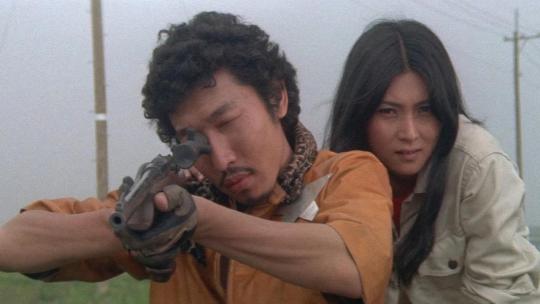

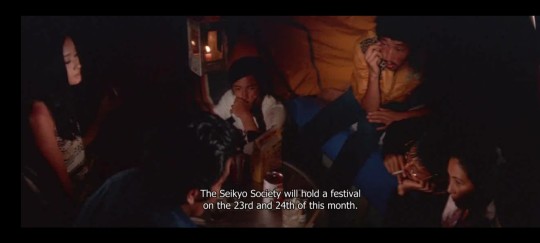
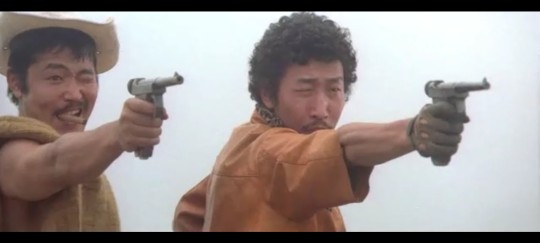
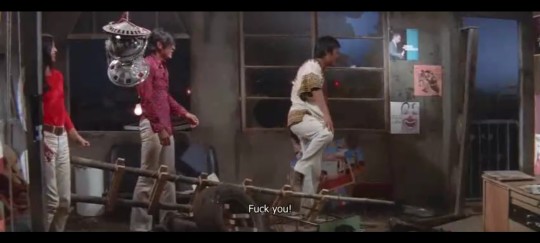



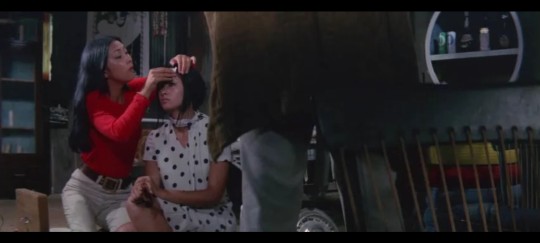
野良猫ロック ワイルドジャンボ
Stray Cat Rock: Wild Jumbo (1970)
0 notes
Photo

Bad movie I have Stray Cat Rock It has Stray Cat Rock:Delinquent Girl Boss 1970, Stray Cat Rock: Wild Jumbo 1970, Stray Cat Rock: Sex Hunter 1970 , Stray Cat Rock: Machine Animal 1970 and Stray Cat Rock: Beat ‘71 (1971)
#Stray Cat Rock:Delinquent Girl Boss#Stray Cat Rock: Beat ‘71#Stray Cat Rock: Machine Animal#Stray Cat Rock: Sex Hunter#Stray Cat Rock: Wild Jumbo#Meiko Kaji#Tatsuya Fuji#Yoshio Harada#Takeo Chii#Rikiya Yasuoka#Yuki Arikawa#Tomoko Aki#Bunjaku Han#Sari Takano#Eiko Matsuda#Masami Maki#Takashi Seyama#Tatsuo Kumoi#Yoshimasa Sato#Kiyoshi Kamoda#Akiko Wada
8 notes
·
View notes
Text
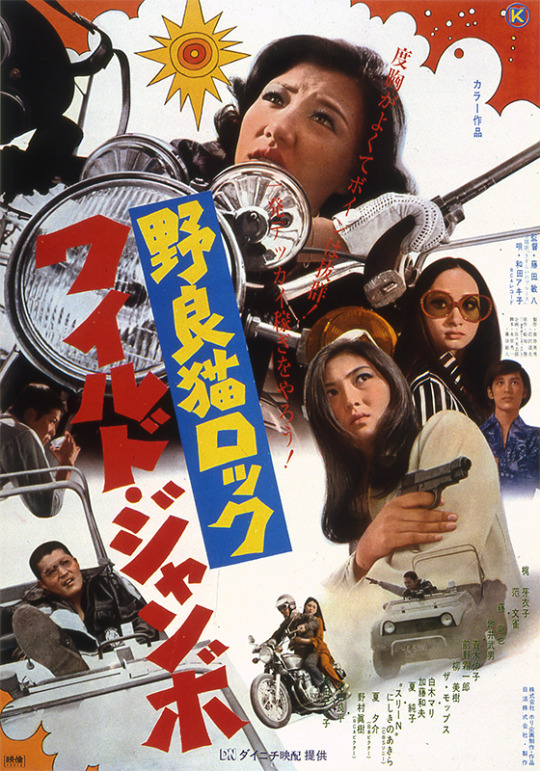
Stray Cat Rock: Wild Jumbo (1970)
dir. Toshiya Fujita
2 notes
·
View notes
Text
Movie Review | The Stray Cat Rock Series (Hasebe & Fujita, 1970-71)
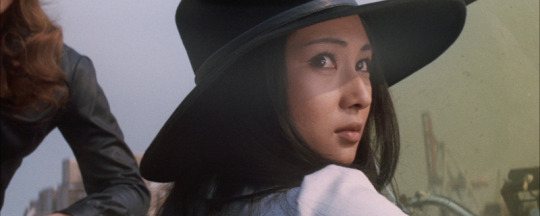
A surprisingly consistent series, frequently unpredictable and always stylish and entertaining. The first entry, Delinquent Girl Boss, might be the best summation of the their strengths, striking a tough, edgy tone yet proving surprisingly tender in its depiction of the camaraderie among its characters, members of an all-girl gang and other societal outcasts. The plot follows the gang as they band together to protect their friend who gets in trouble with another gang after his friend refuses to throw a boxing match. The proceedings are as raucous as the title suggests, lent extra swagger by the brash performance by Akiko Wada as a leather-clad biker who takes up with the gang as well as groovy scoring courtesy of various rock acts (a series fixture), yet when the conclusion arrives, it’s surprisingly deeply felt.
The ending also suggests that this might not be a series in the traditional sense, which quickly becomes clear when the second film, Wild Jumbo, switches to a completely different set of characters, only some of whom are played by returning cast members Meiko Kaji and Tatsuya Fuji. This is probably the most slight of the films, as two thirds of the movie consist of our characters goofing around on a beach in loosely connected vignettes and almost play-acting as soldiers or police, parodying the establishment that wants no part of them (although the stash of antique weapons they find makes some of this “acting” uneasily authentic). The third act brings some welcome focus to the proceedings, as the characters decide to rob a religious organization. The heist does not go as planned, and the film ends on a grim note in stark contrast to the lighthearted tone of the earlier sections.
The series frequently casts its characters in opposition to the establishment and ugly nationalistic sentiments, and nowhere is this dynamic clearest as in Sex Hunter, the misleadingly titled third installment which has our heroes standing up to racially motivated violence after a rival gang starts targeting mixed-race individuals. As always, even when pairing our heroes with a morally righteous mission, the series finds emotional complications and throws in a surprisingly moving subplot about a supporting character coming to terms with her identity. This is the strongest of the entries, and also the one that serves as the clearest testament to Meiko Kaji’s star power. While the first film was arguably led by Akiko Wada and the second was an ensemble piece, this is the first one where Kaji really dominates the proceedings, wresting control of the action with her steely demeanour while producing moments of real poignancy. She even sings a duet with Rikiya Yasuoka in a moving scene that’s one of the film’s best. Let it also be said that while Kaji has one of the best stares in the movies, she also has one of the most underrated smiles. If that sounds like I��m crushing on Kaji, so be it and judge not that ye not be judged.
The fourth film, Machine Animal, has the girls helping a draft dodger escape the country by offloading enough LSD to buy him passage on an outbound ship. It continues to position the characters more as actual gang members rather than stylishly dressed pals who get into knife fights (which is mostly the case with the first movie) while still finding ways to earn our sympathies. It’s comparatively slight and feels closer in quality to the second than to the first and third, but still finds moments of unexpected poetry. The final film, Beat ‘71, returns to the level of relative quality as the first and third films and ends things on a relatively high note. It has Kaji wrongly framed for a murder, leading her comrades to face off against the forces of the culprit’s father, a mayoral candidate trying to maintain the facade of respectability by any means necessary, legality be damned. It has the most political conviction of any of the movies, and situates the climax in a mine dressed up for shooting westerns, which gives the action a nice sense of finality. That being said, one of the promo images promises a scene of Kaji and friends in too cute cowgirl outfits, so if that’s your reason for watching the movie (and I won’t judge), be warned that it never materializes. No matter, for the rest of us, these movies and their improvisational energy, off-the-cuff action filmmaking, deeply felt sense of camaraderie and smuggled in notes of visual poetry, are a real treat.
#film#movie review#stray cat rock: delinquent girl boss#stray cat rock: wild jumbo#stray cat rock: sex hunter#stray cat rock: machine animal#stray cat rock: beat '71#yasuharu hasebe#toshiya fujita#stray cat rock
14 notes
·
View notes
Photo
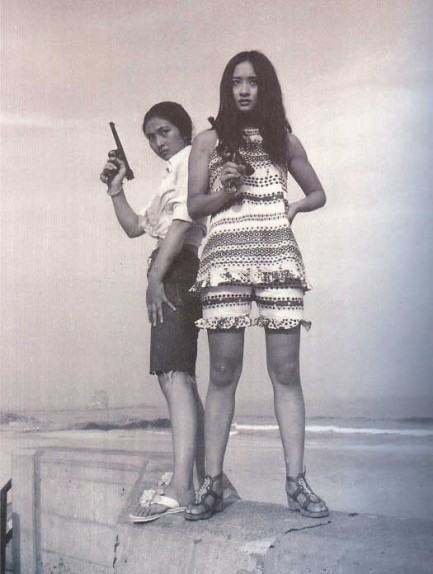
Nora-neko rokku: Wairudo janbo, aka Stray Cat Rock: Wild Jumbo, stars Meiko Kaji and Bunjaku Han in a Nikkatsu Studios/Hori Production co-effort.
#Nora-neko rokku: Wairudo janbo#Stray Cat Rock: Wild Jumbo#Meiko Kaji#Bunjaku Han#film#vintage#japan#1970#pinku#guns
90 notes
·
View notes
Photo
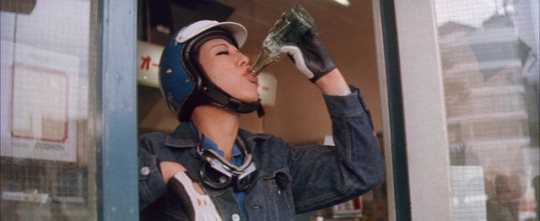
Stray Cat Rock: Wild Jumbo (Fujita Toyisha, 1970) wild jumbo is right. i’m betting this was just a project nikkatsu had lying around, and with the success of the first stray cat movie they decided to attach the name and bring along some of the actors. it's not the same. where's my girl gang?
1 note
·
View note
Photo
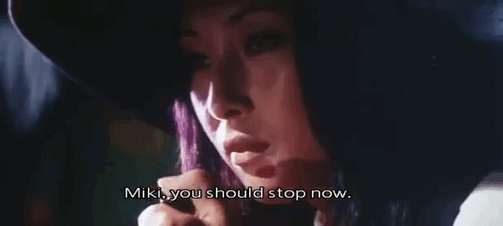
#meiko kaji#meiko kaji gif#stray cat rock wild jumbo#female prisoner 701 scorpion#vintage#Vintage Japan#vintage film#vintage film gif#pinky violence#60s japan#70s japan#anime#anime gif#manga#80s anime#80s anime gif#90s anime#90s anime gif#Japan#japanese#japanese films
147 notes
·
View notes
Text
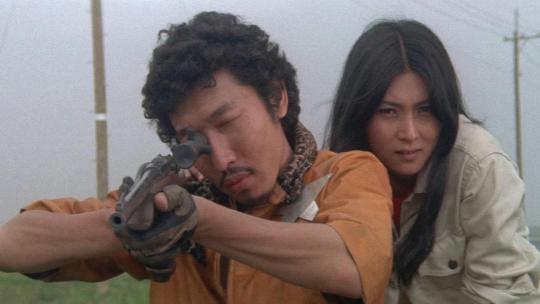
Soichiro Maeno (前野霜一郎) and Meiko Kaji (梶芽衣子) in Stray Cat Rock: Wild Jumbo (野良猫ロック ワイルドジャンボ), 1970, directed by Toshiya Fujita (藤田敏八).
#Meiko Kaji#梶芽衣子#Stray Cat Rock#Toshiya Fujita#野良猫ロック#Soichiro Maeno#Stray Cat Rock: Wild Jumbo#野良猫ロック ワイルドジャンボ#藤田敏八#前野霜一郎#press photo
27 notes
·
View notes
Text
"I bought you a cool leather jacket."
"I ripped it up."
I liked the part with the Molotov cocktails.
The third instalment in the Stray Cat Rock series turned out more like a sequel to the original than Wild Jumbo did, probably due to the return of director Yasuharu Hasebe and a Meiko Kaji led girl gang.
There were a lot of familiar elements to be found: girl gangs, knife fights (in the dark this time, by electric torchlight), off-road vehicles driving erratically, random musical interludes, and a kick-ass soundtrack of jazzy, funky rock. There was also a duet between Meiko Kaji and Rikiya Yasuoka that sounded great.
Where Sex Hunter differed was in its much darker, more serious tone. The plot centred on a conflict between a gang of racists and the Afro-Asian population they considered "half-breeds", and a sub-plot about a guy searching for his long-lost sister. There was also a confusingly presented relationship between the leader of the racists and the leader of the girls.
Along the way was a lot of unfocused meandering that often felt like the stakes were about to raise, then simply didn't. For some reason, Rikiya Yasuoka was kidnapped and beaten up like four separate times, all playing out pretty much identically. I kept thinking they must have finally killed him, only for it to cut to the girls nursing his wounds again.
Things were going great, as I was enjoying the themes of anti-racism and feminism that were being built up, until the end brought it all crashing down in disappointment. The final few minutes were deeply unsatisfying, with some characters I'd been rooting for dying senselessly, and most of the violent racists escaping unharmed.
I noticed that the final shot of Meiko Kaji lowering her head under her big, iconic hat was the exact reverse of the opening shot, bookending the movie in an interesting way.
Another neat thing was that whenever the jazz bar interior was shown the footage was heavily pillarboxed, combining with the loud diegetic music to give the place a close-knit, cosy feeling. This contrasted with the violence that the racists brought into it, smashing the place up and stopping the upbeat music, strengthening the impact of the scene.
Definitely my favourite of the series so far. A great movie, apart from the underwhelming ending.
3 notes
·
View notes
Text
For my own reference:
Stray Cat Rock Movies and Directors, In Order of Production
1. Delinquent Girl Boss (Yasuhara Hasebe)
2. Wild Jumbo (Toshiya Fujita)
3. Sex Hunter (Yasuharu Hasebe)
4. Machine Animal (Yasuharu Hasebe)
5. Beat 71 (Toshiya Fujita)
#okay so i was right about Wild Jumbo#but now i have zero confidence that beat 71 is going to turn out better#i am excited for the others tho#fish ref#stray cat rock#meiko kaji
0 notes
Photo
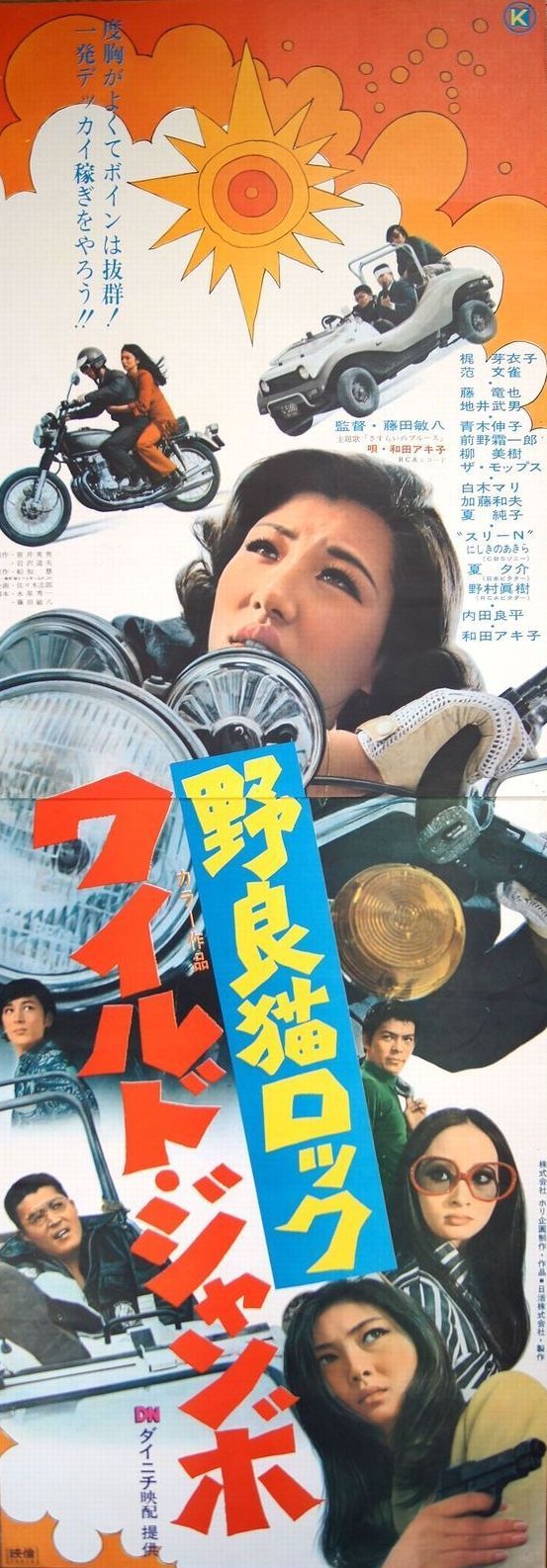
3/10/18
STRAY CAT ROCK: WILD JUMBO, directed by Toshiya Fujita, 1970.
1 note
·
View note
Photo
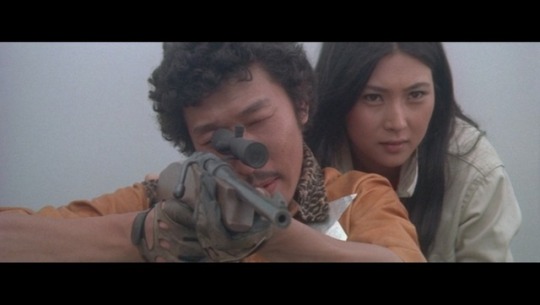
Nora neko rokku wairudo janbo / Yasuharu Hasebe / Japan / 1970
1 note
·
View note
Video
youtube
Stray Cat Rock: Wild Jumbo Original Trailer (Toshiya Fujita, 1970)
0 notes